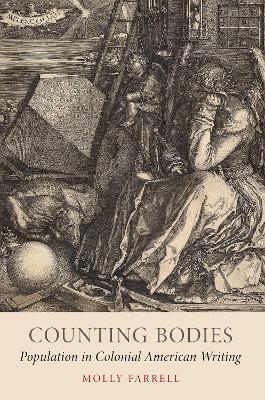
Counting Bodies
Population in Colonial American Writing
Seiten
2019
Oxford University Press Inc (Verlag)
978-0-19-093402-6 (ISBN)
Oxford University Press Inc (Verlag)
978-0-19-093402-6 (ISBN)
Looking to work by William Bradford, Anne Bradstreet, Richard Ligon, Mary Rowlandson, Benjamin Franklin, Thomas Jefferson, and others, Counting Bodies explores the imaginative, personal, and narrative writings that performed the cultural work of normalizing the enumeration of bodies.
Quantifiable citizenship in the form of birth certificates, census forms, and immigration quotas is so ubiquitous that today it appears ahistorical. Yet before the modern colonial era, there was neither a word for "population" in the sense of numbers of people, nor agreement that monarchs should count their subjects. Much of the work of naturalizing the view that people can be represented as populations took place far outside government institutions and philosophical treatises. It occurred instead in the work of colonial writers who found in the act of counting a way to imagine fixed boundaries between intermingling groups.
Counting Bodies explores the imaginative, personal, and narrative writings that performed the cultural work of normalizing the enumeration of bodies. By repositioning and unearthing a literary pre-history of population science, the book shows that representing individuals as numbers was a central element of colonial projects. Early colonial writings that describe routine and even intimate interactions offer a window into the way people wove the quantifiable forms of subjectivity made available by population counts into everyday life. Whether trying to make sense of plantation slavery, frontier warfare, rapid migration, or global commerce, writers framed questions about human relationships across different cultures and generations in terms of population.
Quantifiable citizenship in the form of birth certificates, census forms, and immigration quotas is so ubiquitous that today it appears ahistorical. Yet before the modern colonial era, there was neither a word for "population" in the sense of numbers of people, nor agreement that monarchs should count their subjects. Much of the work of naturalizing the view that people can be represented as populations took place far outside government institutions and philosophical treatises. It occurred instead in the work of colonial writers who found in the act of counting a way to imagine fixed boundaries between intermingling groups.
Counting Bodies explores the imaginative, personal, and narrative writings that performed the cultural work of normalizing the enumeration of bodies. By repositioning and unearthing a literary pre-history of population science, the book shows that representing individuals as numbers was a central element of colonial projects. Early colonial writings that describe routine and even intimate interactions offer a window into the way people wove the quantifiable forms of subjectivity made available by population counts into everyday life. Whether trying to make sense of plantation slavery, frontier warfare, rapid migration, or global commerce, writers framed questions about human relationships across different cultures and generations in terms of population.
Molly Farrell is Associate Professor of English at Ohio State University.
Acknowledgements
Introduction: Stories of Cataclysm and Population
Chapter 1: Poetics of the Ark Ashore
Chapter 2: Measuring Caribbean Aesthetics
Chapter 3: Counting in King Philip's War
Chapter 4: The Death and Life of Colonial Mortality Bills
Epilogue: Mourning the Figure of Three-fifths
Notes
Index
| Erscheinungsdatum | 04.01.2019 |
|---|---|
| Zusatzinfo | 26 illus. |
| Verlagsort | New York |
| Sprache | englisch |
| Maße | 208 x 137 mm |
| Gewicht | 295 g |
| Themenwelt | Geschichte ► Teilgebiete der Geschichte ► Wirtschaftsgeschichte |
| Geisteswissenschaften ► Sprach- / Literaturwissenschaft ► Anglistik / Amerikanistik | |
| Geisteswissenschaften ► Sprach- / Literaturwissenschaft ► Literaturwissenschaft | |
| Sozialwissenschaften ► Soziologie ► Empirische Sozialforschung | |
| ISBN-10 | 0-19-093402-6 / 0190934026 |
| ISBN-13 | 978-0-19-093402-6 / 9780190934026 |
| Zustand | Neuware |
| Haben Sie eine Frage zum Produkt? |
Mehr entdecken
aus dem Bereich
aus dem Bereich
Buch | Hardcover (2012)
Westermann Schulbuchverlag
34,95 €
Schulbuch Klassen 7/8 (G9)
Buch | Hardcover (2015)
Klett (Verlag)
30,50 €
Buch | Softcover (2004)
Cornelsen Verlag
25,25 €



